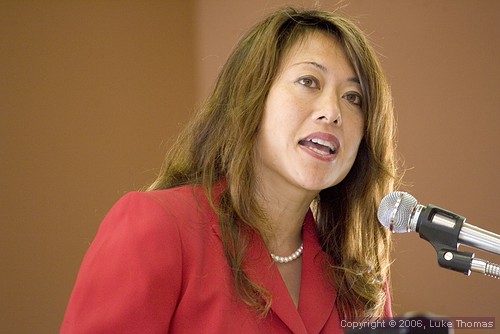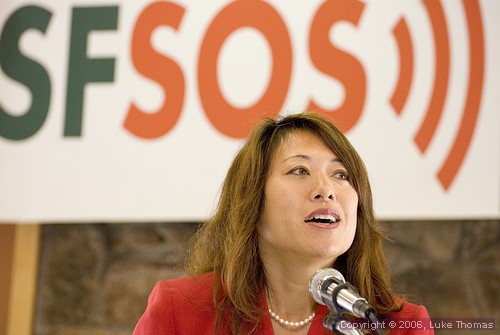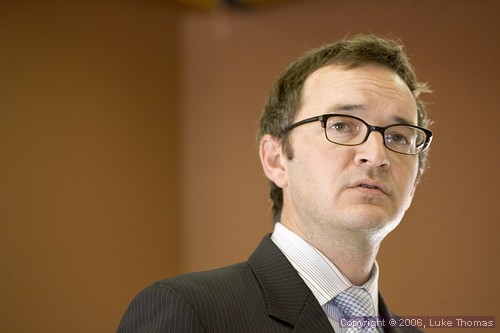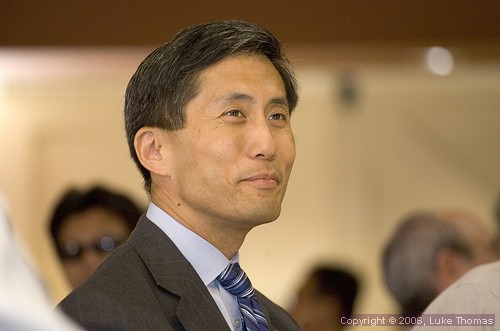Fiona Ma pledges to open San Francisco politics to all
Not just the organized few

California Assembly District 12 Fiona Ma candidate tells South
Beach gathering she learned importance of being of service to
all early in her political career.
Photo(s) by
Luke Thomas
By Pat Murphy
July 28, 2006
The organized few now define San Francisco politics to the detriment
of everyone else, California Assembly candidate Fiona Ma said
yesterday.
Redefinition will come through her leadership, she added.
As Democratic Party nominee for the Assembly 12th District with
overwhelmingly Democrat registration, Ma appears near certain
victor in the November 7 general election.
Now the San Francisco supervisor from District 4, Ma appeared
Wednesday as keynote speaker before a South Beach luncheon hosted
by the SFSOS advocacy group.

She noted that the 'SOS' in SFSOS is a seafaring distress signal
and drew an analogy.
"City government has failed its residents by allowing only
the loudest, the most politically connected, the most persistent
to define the politics to date," stated Ma.
"And everyone else remains lost at sea."
She proposed a redefinition of politics for San Francisco representation
at the statewide level.
The basic commitment of availability to everyone came early in
her political career, Ma stated.
"I got my public service with State Senator John Burton
and the most important thing I learned is that we need to help
everybody.
"As a district aide, like Rob
Black, I worked to help constituents address a range of problems
for state government.

Rob Black
"If someone had fallen on hard times and was waiting for
their Workmen's Compensation, our office helped.
"A new business confused about state licensing could call
us.
"And a company interested in doing business in San Francisco
could call us and learn the rules and the opportunities."
That approach to service stayed with her, Ma continued.
"It is the same view that I have taken as a local elected
official.
"While the Board (of Supervisors) states the finer points
of international policy or weighs in on countless federal issues
my office has been a resource for residents of the West Side concern
for basic City services."

Doug Chan attends SFSOS luncheon as a candidate to replace Fiona
Ma in San Francisco Supervisor District 4.
She pointed to benefit of collaboration.
"Supervisor Bevan Dufty and I served on the Board's City
Operations and Neighborhood Services Committee which is often
is as much about solving individual problems as it is about making
sweeping policy declarations.
Full speech by Fiona Ma follows:
CHARTING A BOLD COURSE FOR SAN FRANCISCO'S FUTURE
I am pleased to be here today. First, let me thank SFSOS, your
board members and staff, especially Wade Randlett, Ryan Chamberlain
and Dan Wong, as well as every one of the 250 people here today,
for your ongoing commitment to protecting our quality of life,
improving public education and defending our shared values.
In a time when many people are tuning out of our public discourse,
you are lifting your voices, raising your pens and harnessing
the power of e-mail and the Internet to communicate your views
to public officials. It is critically important that this work
continues.
It will never be enough for a few individuals to lobby government
alone, whether they are businesspeople, union officials or neighborhood
leaders. Only when each and every one of us speaks up and exercises
the full power of our citizenship, in a common and unified voice,
will we be effective. That is the goal of SFSOS and why I am proud
to join you today.
Last time I joined you, one of our City's weekly publications
reported my comments out of context. Just so there's no confusion,
I have prepared remarks today and the complete text of my comments
is available here today.
As I was preparing my remarks today, I thought I would try to
weave the meaning of SOS into my words, so I did a little research
hoping to find a catchy acronym. After all, we've heard the phrases
"Save Our Ship," "Send Out Sailors," or "Save
Our Souls." In reality, SOS is a simple distress signal adopted
in 1908 to unify the way those in distress seek help, a series
of dots and dashes without a specific meaning. Before SOS was
adopted, people seeking help used a number of different methods-
signal flags, flares, bells and foghorns. Even as late as the
sinking of the Titanic in 1912, different codes were used to call
for help. That's a lot like City government in San Francisco.
Although many different people and groups need help-from homeless
families to small business owners, park advocates to domestic
violence survivors, from scared residents in violence-ravaged
neighborhoods to young families trying to buy their first home-there's
no common signal to seek help. City government has failed its
residents by allowing only the loudest, the most politically connected
and the most persistent to define the policy debate. Everyone
else remains lost at sea.
I got my start in public service with State Senator John Burton,
and the most important thing I learned is that it's people matter
the most-each and every one of them. As a district aide, I worked
to help constituents address a range of problems with state government.
If someone had fallen on hard times and was waiting for their
unemployment insurance check, our office helped. A new business
owner confused about state licensing or workers compensation policies
could call and get assistance. A company interested in doing business
in our state could call us to learn the rules and opportunities.
It's the same view I've taken as a local elected official. While
the Board debates the finer points of international policy or
weighs in on countless federal issues, my office has been a resource
for residents of the West Side concerned about basic city services.
Supervisor Bevan Dufty and I serve on the Board's City Operations
and Neighborhood Services Committee, which is often as much about
solving individual problems as it is about passing new laws.
Sometimes, we find that policy solutions are needed for complicated
neighborhood problems. For example, Supervisor Sean Elsbernd led
our efforts to resurface roads all across San Francisco-a $15
million undertaking made possible by unexpected growth in the
City's revenues. When violence escalated earlier this year, Mayor
Newsom and I worked together to invest $6.3 million in programs
that created 600 new summer jobs for young people in high-risk
neighborhoods and accelerate police academy classes to make sure
we had enough officers on our streets.
All too often, however, those of us who care most about the nuts
and bolts of city services find ourselves performing a lot of
constituent assistance and responding to policy ideas that make
even that work more difficult. Measures to limit homeownership
come before the Board nearly every month, even as we fail to create
enough new housing units. Tax increases are proposed each year
while residents are asked to wait longer for basic city services.
Fees continue to rise while the quality of City services often
heads in the opposite direction. Public safety departments are
slashed in the budget process, while crime rises in our neighborhoods
and we face brownouts at our firehouses. When we're lucky enough
to beat back these proposals, we're no better than when we started.
That is why today I am answering the call of SOS, and proposing
a policy agenda that builds on the lessons I've learned about
what matters in San Francisco. With five months remaining in my
term on the Board, and 18 months left in Mayor Newsom's term,
we have a unique opportunity to ask the Board of Supervisors and
all of City government to respond to SOS, embarking on a course
headed toward the future.
I know that most San Franciscans agree with us. They expect common-sense
solutions to their everyday problems. So, let's chart that course
together. Here are just a few ideas to get our conversation started.
A HOUSED SAN FRANCISCO: ONE COMPREHENSIVE HOUSING WAITING
LIST FOR FIRST TIME HOMEOWNERS & ALL RENTERS
If you look at the housing market in San Francisco, the most
common SOS is the old saying Sink or Swim. Market rate housing
is incredibly expensive, even for dual income families with good
jobs. The lack of new housing construction at all income levels
has put an even greater strain on the current housing stock, the
subject of many of our most contentious City Hall hearings.
So, how does San Francisco respond to those people calling out
for help across all income levels? We make the process incredibly
complicated, asking working people to travel to dozens of separate
locations if they want to become a first-time homebuyer through
our inclusionary housing program. Low-income families often miss
out when government finally responds, because in the five years
it takes to move up on the Housing Authority's waiting list, contact
information is often out of date.
Here's an idea: let's use the best practices of countless other
cities. If you're a San Francisco resident and need housing assistance,
let's ask you to sign up once. Provide your income and the type
of housing you need based on family size and let the City do the
rest. Once a unit opens up, the next person on the list would
be eligible. If they're a first-time homebuyer, we can offer services
while they wait on the list: financial planning or mortgage prequalification,
for instance.
If we manage housing resources wisely, we can target affordable
rental housing to renters facing eviction so they can stay in
San Francisco, without denying young families the chance to own
their own home. And at the end of the day, one centralized list
provides a clear picture of our housing situation and possibly
a road map to fix it.
A SAFER SAN FRANCISCO: IMPROVING LAW ENFORCEMENT'S INFORMATION
TECHNOLOGY AND COORDINATING SERVICES FOR DOMESTIC VIOLENCE SURVIVORS
When I first joined the Board in 2002, there were just two women
of the eleven members. Even now, is 3 of 11 really representative
of San Francisco? I have been proud to be a champion on issues
affecting women, helping to curb human trafficking by cracking
down on massage parlors that are often fronts for exploitation
and working to ensure that young women get access to the healthcare
they need.
Yet there's one issue that needs the full attention and commitment
of both women and men in local government, and that's ending domestic
violence.
Many of you know the story of Claire Joyce Tempongko, a Richmond
District resident who called out for help and saw government fail
her, costing her life. Her boyfriend, Tari Ramirez, had been arrested
often. She sought a restraining order. Yet the lack of coordination
and sensitivity in our law enforcement system resulted in Tari
stabbing her to death in front of her two young children.
Advocates pushed for a system called JUSTIS; an information
technology solution designed to link 10 criminal justice agencies
together and established in the City's Administrative Code by
then-Supervisors Michael Yaki and Gavin Newsom back in 2000. After
almost nine years and $29 million, we're still not there. Government
can and must do better. Before I leave the Board, I want to renew
the City's commitment to fully integrating our law enforcement
IT so it works.
A GREENER SAN FRANCISCO: SETTING STANDARDS AT PARKS AND RECREATION
CENTERS & IMPLEMENTING THE RECREATION AND PARK DEPARTMENT
AUDIT
Wouldn't it be great if you could actually figure out how many
city employees worked at your local park or recreation center?
While it seems like a reasonable request, it's been difficult
to get the information. Gardeners are overworked, and instead
of simply tending to the parks, they often pick up trash and serve
as social workers. A long-awaited audit of the Recreation and
Park Department provides a clear path to improving our parks.
Instead of holding hearings on whether the City should take over
every private function, including WiFi, perhaps the Board should
focus on those functions the City already takes on.
A SMALL BUSINESS-FRIENDLY SAN FRANCISCO STREAMLINING PERMITTING
FOR SMALL BUSINESS
Working with the Small Business Commission, my office helped
develop a report that demonstrates conclusively that government
regulation is literally shutting the doors of small businesses.
There is no one-stop shop to help someone learn all of the approvals
they may need. Often, departments provide unreliable or conflicting
advice. Other communities-notably San Diego-have centralized their
permitting functions so working people can start a business and
get back to work to grow our economy. It's time San Francisco
does the same. By the end of this year, we must recommit to establishing
a customer friendly office that makes City government work for
small business.
A SMARTER SAN FRANCISCO: LINKING CITY GOVERNMENT, NONPROFIT
GROUPS AND THE PRIVATE SECTOR TO THE SAN FRANCISCO UNIFIED SCHOOL
DISTRICT TO IMPROVE EDUCATION
Even though the City has little to do with managing our public
schools, I believe every San Franciscan has a role to play in
supporting public education. Especially now that the City is investing
$460 million through Proposition H, we have to ask the tough question:
Will enrollment ever rise if we keep on the same path? A parent
choosing to send their children to a public school is the best
financial plan to keep the school district solvent. After all,
when families leave San Francisco or choose a private school,
our state reimbursements head in an adverse direction.
We have an opportunity this August to ensure that families can
choose to send their child to a quality school close to home.
Make no mistake, the opening of Senator Dianne Feinstein Elementary
should ring loud and clear that San Francisco Unified is committed
to opening schools in neighborhoods where there is demand to reduce
overcrowding.
We must be sensitive to calls for equity. But I would suggest
that it is unfair to children from every neighborhood to demand
that they travel for more than an hour simply to get to elementary
school. When the School Board voted to close a successful Japanese
bilingual program in my district, and ask families to send their
kids all the way to the Western Addition, parents responded. Some
took kids out of public schools altogether. Most got their children
reassigned to Feinstein. Just a few followed the school all the
way across town. Together, we will work to prevent this type of
ill-advised decision in the future.
The course to a brighter future is not easy. The number of people
who need help in our City is growing. The obstacles are great.
Together, we can answer their call by lifting our voices together.
And perhaps the greatest SOS we can give them is a Sense of Security.
Thank you for your work, thank you for your support. Together,
we're going to stand up for our schools, save our streets and
serve our City.
####
|